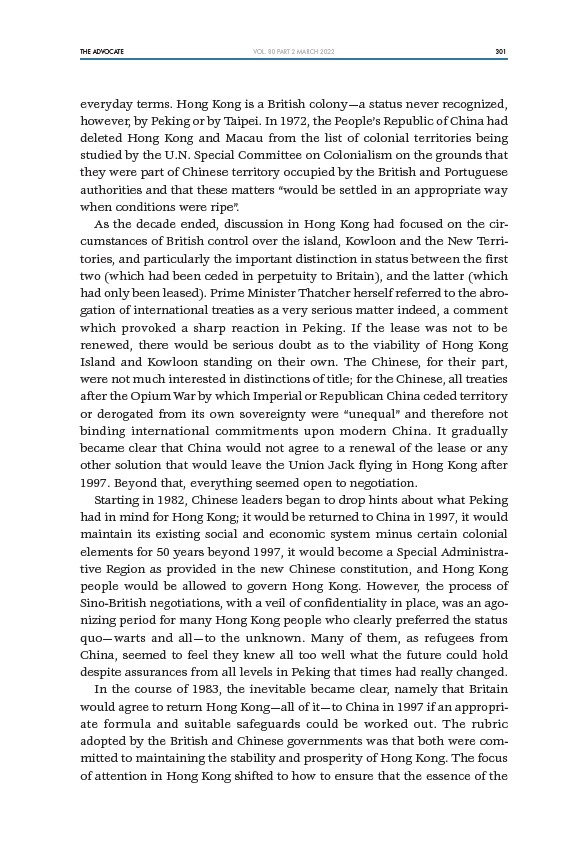
THE ADVOCATE 301
VOL. 80 PART 2 MARCH 2022
everyday terms. Hong Kong is a British colony—a status never recognized,
however, by Peking or by Taipei. In 1972, the People’s Republic of China had
deleted Hong Kong and Macau from the list of colonial territories being
studied by the U.N. Special Committee on Colonialism on the grounds that
they were part of Chinese territory occupied by the British and Portuguese
authorities and that these matters “would be settled in an appropriate way
when conditions were ripe”.
As the decade ended, discussion in Hong Kong had focused on the circumstances
of British control over the island, Kowloon and the New Territories,
and particularly the important distinction in status between the first
two (which had been ceded in perpetuity to Britain), and the latter (which
had only been leased). Prime Minister Thatcher herself referred to the abrogation
of international treaties as a very serious matter indeed, a comment
which provoked a sharp reaction in Peking. If the lease was not to be
renewed, there would be serious doubt as to the viability of Hong Kong
Island and Kowloon standing on their own. The Chinese, for their part,
were not much interested in distinctions of title; for the Chinese, all treaties
after the Opium War by which Imperial or Republican China ceded territory
or derogated from its own sovereignty were “unequal” and therefore not
binding international commitments upon modern China. It gradually
became clear that China would not agree to a renewal of the lease or any
other solution that would leave the Union Jack flying in Hong Kong after
1997. Beyond that, everything seemed open to negotiation.
Starting in 1982, Chinese leaders began to drop hints about what Peking
had in mind for Hong Kong; it would be returned to China in 1997, it would
maintain its existing social and economic system minus certain colonial
elements for 50 years beyond 1997, it would become a Special Administrative
Region as provided in the new Chinese constitution, and Hong Kong
people would be allowed to govern Hong Kong. However, the process of
Sino-British negotiations, with a veil of confidentiality in place, was an agonizing
period for many Hong Kong people who clearly preferred the status
quo—warts and all—to the unknown. Many of them, as refugees from
China, seemed to feel they knew all too well what the future could hold
despite assurances from all levels in Peking that times had really changed.
In the course of 1983, the inevitable became clear, namely that Britain
would agree to return Hong Kong—all of it—to China in 1997 if an appropriate
formula and suitable safeguards could be worked out. The rubric
adopted by the British and Chinese governments was that both were committed
to maintaining the stability and prosperity of Hong Kong. The focus
of attention in Hong Kong shifted to how to ensure that the essence of the